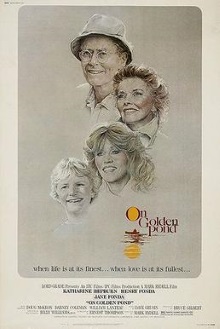
This is the second in the series of films that my wife picked out about senescence and its debilitating effects on the mind in particular. I believe that On Golden Pond was a much more prominent work than Away From Her, featuring as it does a star-studded cast. I find myself embarrassed that while it is the more traditional and even more sentimental film, I actually like it more due to how well-rounded it is and the excellent performances.
An aged couple, Ethel and Norman Thayer, spend the summer at their lakeside cottage called Golden Pond. Norman has memory problems resulting in him having difficulty recognizing faces in photographs and remembering the paths around the cottage. This only exacerbates his grumpiness and he frequently talks about his impending death. Their only child, Chelsea, visits them with her boyfriend Bill and Bill’s son Bill Jr. from a previous marriage. We learn that Chelsea and Norman have a poor relationship due to Norman’s acerbic tongue though Ethel tries to reassure her that he does love her though he has problems showing it. Chelsea and Bill leave on a vacation to Europe and they decide to leave Bill Jr. at the cottage. The boy tries to assert his independence at first but soon grows close to Norman when they go fishing together.
Unlike Away From Her with its singular focus on how Alzheimer’s disease is slowly destroying Fiona’s mind, this film is more about aging in general and how it affects Ethel and Norman’s lives and their relationships. I especially like how the film portrays Norman’s character. He is terrified of death and afraid of revealing that anyone except for his wife. This fear makes him even more bad tempered than he usually is. At the same time, he is well aware of being perceived as the curmudgeonly old man and enjoys playing up the part. I love the scene of Bill Sr. confronting him over it without being overly aggressive, saying that he’ll try to be as patient and tolerant as he can be for Chelsea’s sake but there’s only so far that he can be pushed. Even the 13-year old Bill Jr. calls him out for scolding others for no reason, something that I only recently mentioned in conversation with my wife wouldn’t be possible in an Asian society.
It surprised me that this film works as well as it does because it’s so traditional and old-fashioned in so many ways. The orchestral score choreographs every emotional beat. The golden hues are an exact match for the setting and the film’s themes. Even lines like the loons welcoming them ought to sound cheesy. Yet it does work and there’s no way that anyone would dismiss this as a made for television movie. Katharine Hepburn is simply incredible as a woman who dearly loves both her daughter and her husband and is frustrated that they can’t appreciate one another. It is a very sentimental film but the excellence of the cast makes it all too believable.
At the time of its release, this film was especially poignant as everyone was aware that this would likely the final important appearances by Hepburn and Henry Fonda. Fonda in particular really was quite fragile at the time. This is less relevant as we watch it now but it really is a rather moving and remarkable film.